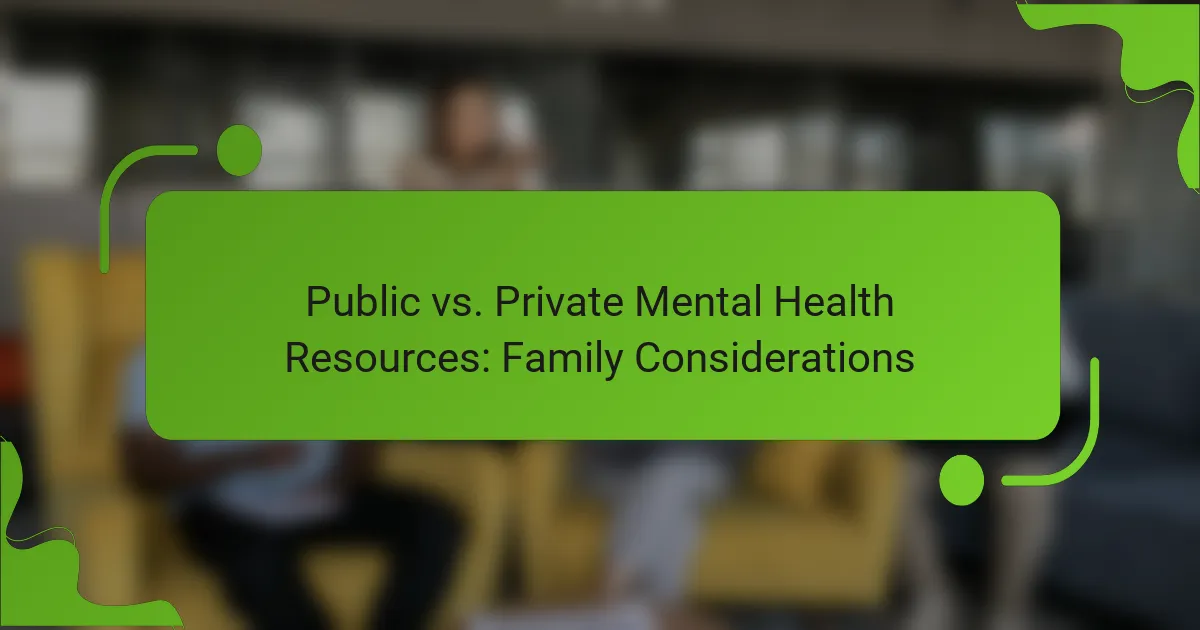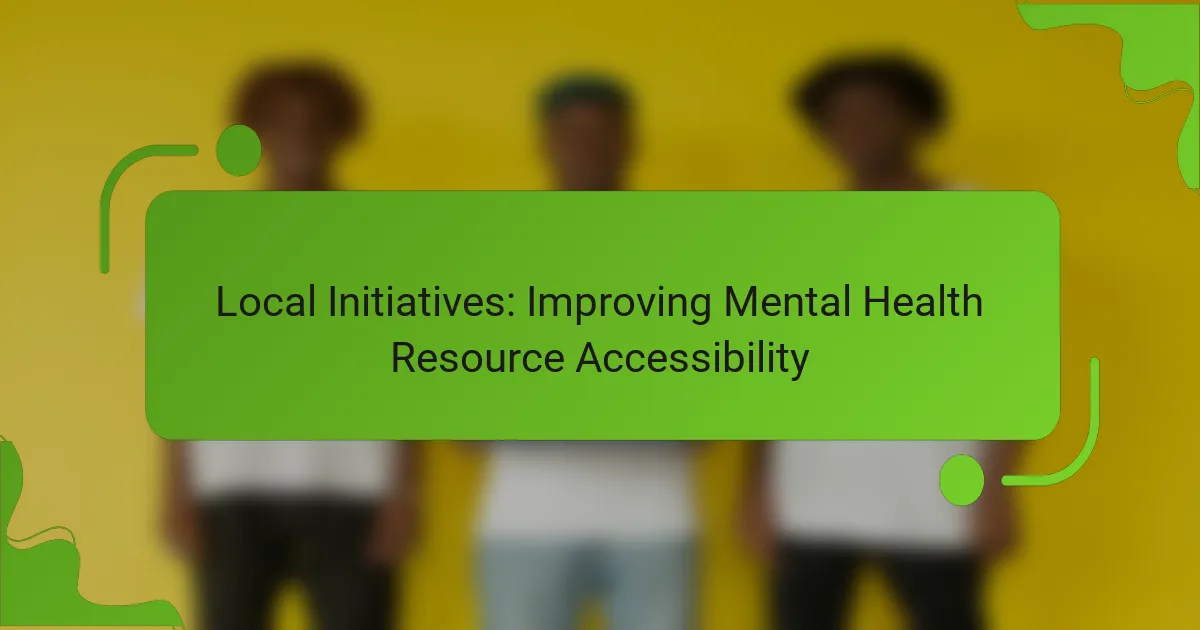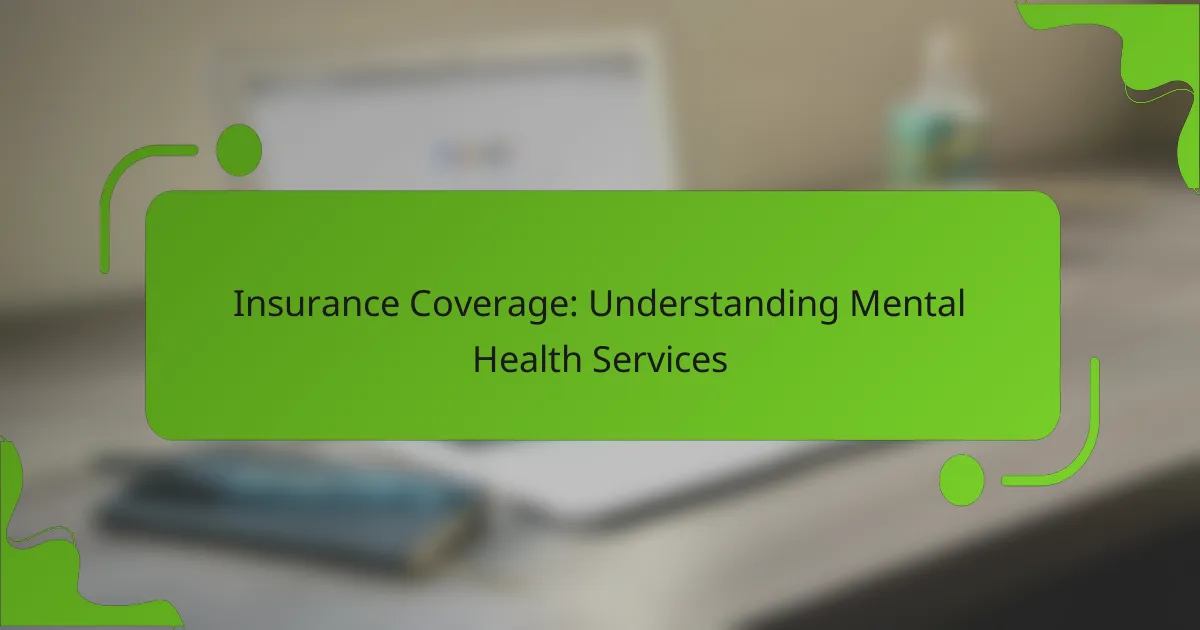Perheiden mielenterveyspalveluiden valinta Suomessa voi olla haastavaa, sillä julkisten ja yksityisten resurssien välillä on merkittäviä eroja. Julkiset palvelut tarjoavat kattavaa tukea ilman suurta taloudellista rasitetta, kun taas yksityiset vaihtoehdot tarjoavat räätälöityjä palveluja, mutta korkeammalla hinnalla. On tärkeää arvioida perheen tarpeet, kustannukset ja asiantuntijoiden saatavuus ennen päätöksentekoa.
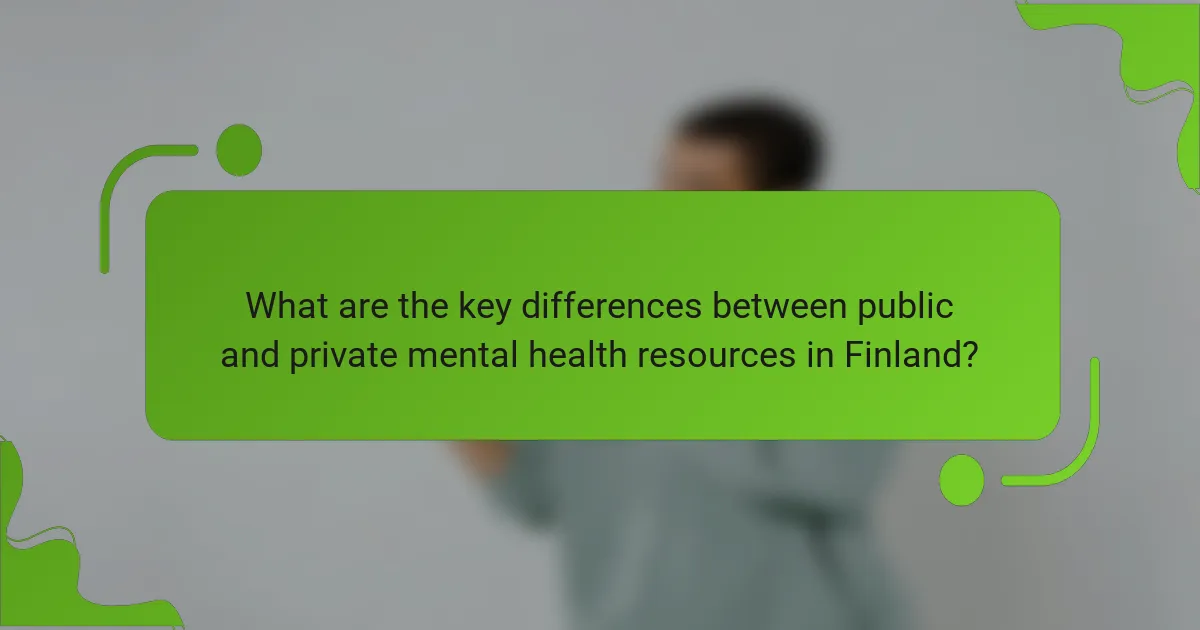
What are the key differences between public and private mental health resources in Finland?
The main differences between public and private mental health resources in Finland lie in funding, accessibility, service personalization, and costs. Public resources are primarily government-funded and may have longer wait times, while private resources offer tailored services but come at a higher cost.
Public resources are funded by the government
In Finland, public mental health services are financed through taxation, ensuring that basic mental health care is accessible to all residents. These services typically include counseling, therapy, and psychiatric support, which are provided at little to no direct cost to the individual.
However, the reliance on government funding can lead to budget constraints, impacting the availability and quality of services. This may result in longer wait times for appointments and limited access to specialized care.
Private resources offer personalized services
Private mental health resources in Finland provide a range of personalized services that can be tailored to individual needs. These services often include one-on-one therapy, specialized programs, and immediate access to professionals.
Families seeking specific types of therapy or more flexible scheduling may find private options more suitable. However, the cost of these services can be significant, often requiring out-of-pocket payments or private insurance coverage.
Access and wait times vary significantly
Access to public mental health resources can be limited by long wait times, sometimes extending to several weeks or even months for initial consultations. This can be challenging for families needing immediate support.
In contrast, private resources typically offer quicker access to services, with many providers able to schedule appointments within days. This immediacy can be crucial for families facing urgent mental health issues.
Cost implications for families differ
Public mental health services are generally free or low-cost, making them more accessible for families with limited financial resources. However, the trade-off may be longer wait times and less personalized care.
Private mental health services, while offering quicker access and tailored support, can be expensive. Families may need to budget for these costs, which can range from hundreds to thousands of euros annually, depending on the frequency of visits and types of services required.
Types of services provided vary
Public mental health resources typically focus on essential services such as crisis intervention, basic therapy, and medication management. These services are designed to address a wide range of mental health issues but may lack specialization.
Private mental health providers often offer a broader array of services, including alternative therapies, specialized programs for specific conditions, and holistic approaches. Families may choose private options to access these diverse services that cater to unique needs.
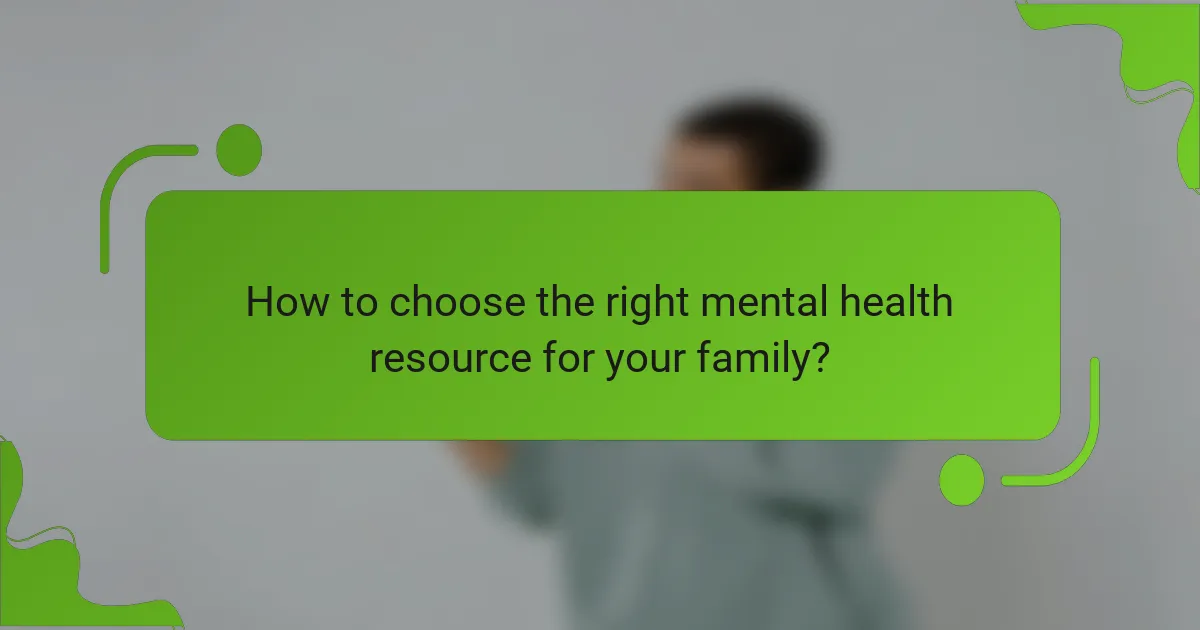
How to choose the right mental health resource for your family?
Choosing the right mental health resource for your family involves understanding your unique needs, evaluating costs, and considering the availability of specialists. It’s essential to gather information and make informed decisions that align with your family’s circumstances and preferences.
Assess your family’s specific needs
Identifying your family’s specific mental health needs is the first step in selecting appropriate resources. Consider factors such as age, existing mental health conditions, and the type of support required, whether it’s therapy, counseling, or medication management.
For example, children may benefit from child psychologists, while adults might need therapists specializing in anxiety or depression. Understanding these needs will help narrow down your options effectively.
Evaluate the cost and insurance coverage
Cost is a significant factor when choosing mental health resources. Check if your health insurance covers mental health services and what percentage of the costs will be out-of-pocket. Many providers offer sliding scale fees based on income, which can make services more affordable.
In Finland, for instance, public mental health services are often more cost-effective, while private services may offer quicker access but at a higher price. Compare the potential expenses to find the best fit for your budget.
Consider the availability of specialists
The availability of qualified mental health specialists can vary significantly. Research local providers to ensure that the necessary experts are accessible to your family. Some areas may have a shortage of certain specialists, which can lead to longer wait times for appointments.
Utilizing online directories or local health services can help you identify available professionals in your area, ensuring you can get timely support when needed.
Look for recommendations and reviews
Gathering recommendations from trusted sources can guide you in selecting the right mental health resource. Speak with friends, family, or healthcare providers who may have insights into effective professionals or facilities.
Additionally, online reviews and ratings can provide valuable information about the experiences of others. Websites that aggregate reviews can help you assess the reputation and effectiveness of potential providers.
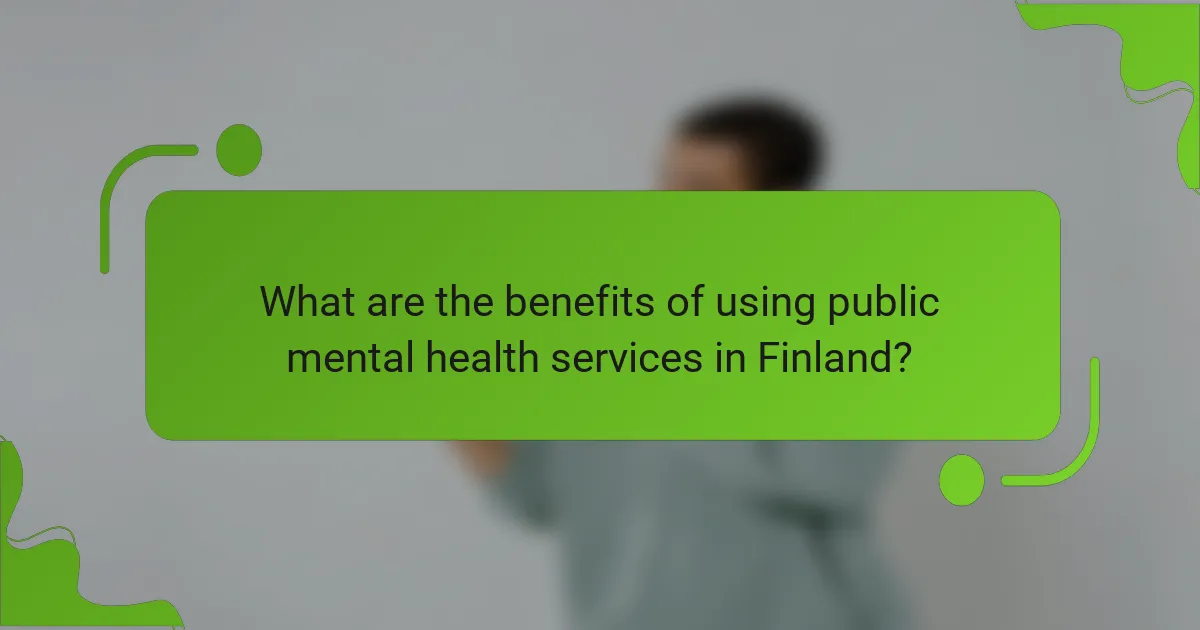
What are the benefits of using public mental health services in Finland?
Public mental health services in Finland offer comprehensive support for families, ensuring access to essential resources without significant financial burden. These services are designed to be inclusive, providing a range of options tailored to various needs.
Access to a wide range of services
Public mental health services in Finland provide access to diverse resources, including counseling, therapy, and psychiatric care. Families can benefit from specialized programs for children, adolescents, and adults, ensuring that all age groups receive appropriate support.
Additionally, these services often include community-based programs that promote mental well-being, such as support groups and educational workshops. This variety allows families to choose the most suitable options for their specific situations.
Lower costs for families
Utilizing public mental health services in Finland generally incurs lower costs compared to private options. Many services are funded by the government, which means families often pay minimal fees or none at all, making mental health care more accessible.
This financial relief is particularly beneficial for families facing economic challenges, as it allows them to prioritize mental health without the burden of high expenses. Public services often have sliding scale fees based on income, further enhancing affordability.
Integrated care with other health services
Public mental health services in Finland are typically integrated with other healthcare systems, facilitating comprehensive care for individuals. This integration allows for seamless communication between mental health professionals and primary care providers, ensuring that all aspects of a patient’s health are considered.
For families, this means that mental health support can be coordinated with physical health services, leading to better overall outcomes. For example, a child receiving treatment for anxiety can also be monitored for any related physical health issues, creating a holistic approach to care.
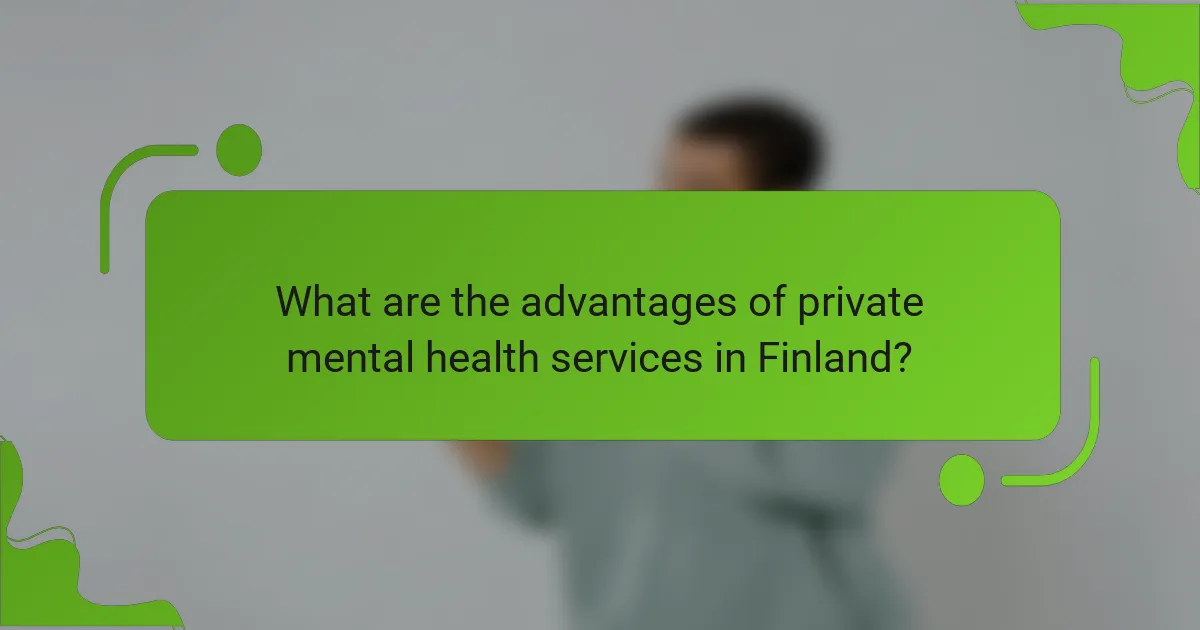
What are the advantages of private mental health services in Finland?
Private mental health services in Finland offer several advantages, including quicker access to care, personalized treatment options, and enhanced confidentiality. These factors can significantly impact the effectiveness of mental health support for individuals and families seeking assistance.
Shorter wait times for appointments
One of the primary benefits of private mental health services is the shorter wait times for appointments. In many cases, individuals can secure a consultation within a few days, compared to the public sector, where waits can extend to several weeks or even months.
This rapid access allows families to address mental health issues promptly, reducing the risk of deterioration in the individual’s condition. Quick appointments can be crucial for those in crisis or needing immediate support.
More tailored treatment plans
Private mental health services often provide more tailored treatment plans that cater to the specific needs of the individual. Practitioners in the private sector typically have more flexibility to design personalized approaches, incorporating various therapeutic modalities and interventions.
This customization can lead to more effective outcomes, as treatment can be adjusted based on ongoing feedback and progress. Families can work closely with providers to ensure that the treatment aligns with their values and preferences.
Greater privacy and confidentiality
Another significant advantage of private mental health services is the enhanced privacy and confidentiality they offer. Many individuals feel more comfortable discussing sensitive issues in a private setting, which can lead to more honest and open communication with their therapist.
Private services often have stricter confidentiality policies, which can help alleviate concerns about stigma or judgment. This assurance can encourage families to seek help sooner and engage more fully in the therapeutic process.
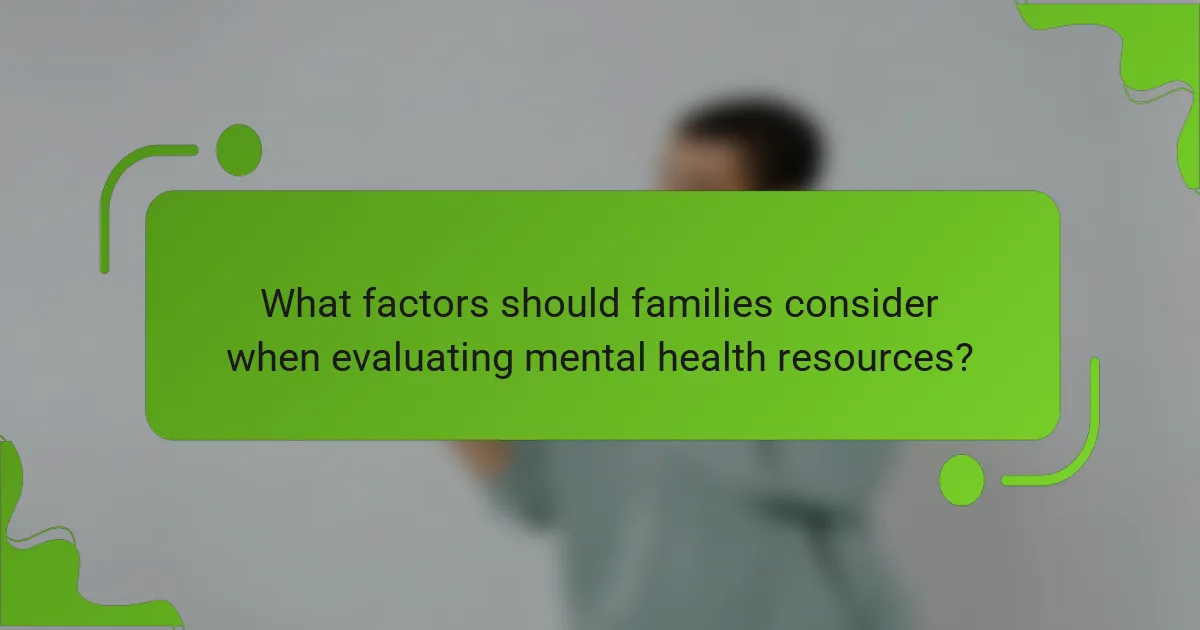
What factors should families consider when evaluating mental health resources?
Families should consider accessibility, cost, and the type of treatment offered when evaluating mental health resources. Understanding these factors can help families choose the most suitable option for their needs.
Accessibility of Services
Accessibility refers to how easily families can reach mental health services, including location, availability of appointments, and whether services are offered in-person or online. Families should assess whether the resources are conveniently located and if they can accommodate their schedules.
For example, public mental health services may have longer wait times but are often more affordable, while private services might offer quicker access but at a higher cost. Evaluating both options can help families find a balance between convenience and affordability.
Cost Considerations
Cost is a significant factor when choosing mental health resources. Public services in Finland are generally funded by taxes, making them more affordable, while private services require out-of-pocket payments or insurance coverage.
Families should consider their budget and whether they have health insurance that covers mental health services. It’s also wise to inquire about sliding scale fees or payment plans that some private providers may offer.
Type of Treatment Offered
The type of treatment available can vary significantly between public and private mental health resources. Public services may focus more on medication management and crisis intervention, while private providers often offer a broader range of therapies, including cognitive-behavioral therapy and family counseling.
Families should evaluate the specific needs of their members and seek resources that align with those needs. For instance, if a family member requires specialized therapy, they may need to explore private options that provide those specific services.
